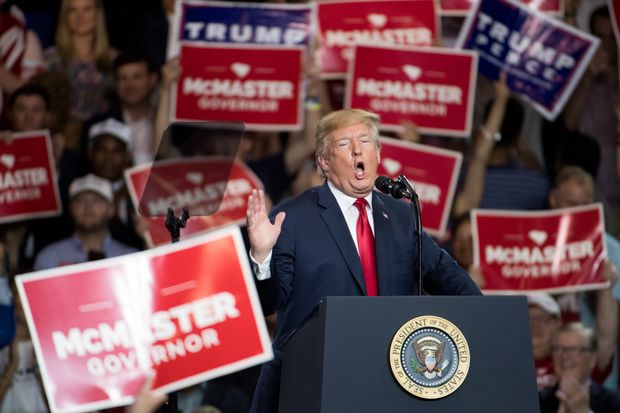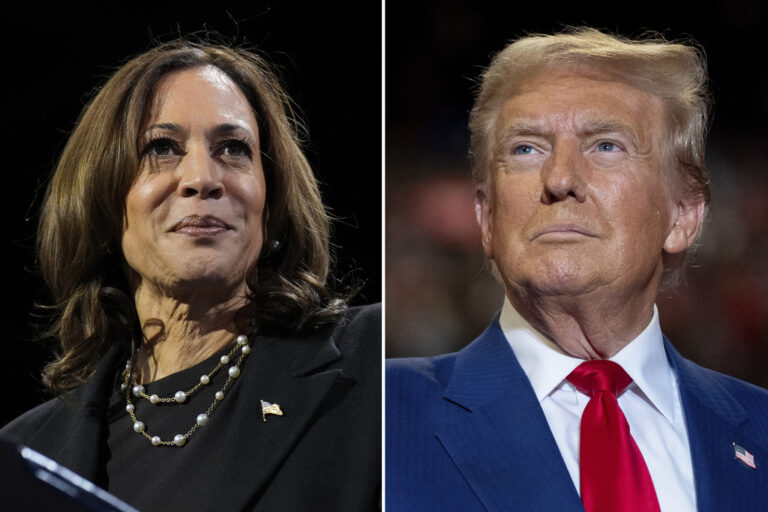President Donald Trump is not on the ballot, but he has invested time, energy and political capital in a slate of primary contests across America that will again test his clout within his own party.
Voters weigh in on candidates in seven states Tuesday, but the contest that matters most to Trump is South Carolina, where he appeared at a rally to help Gov. Henry McMaster hours before polls opened. The Republican governor, one of Trump’s first high-profile supporters, is fighting for his political life against self-made millionaire John Warren in a runoff election that threatens to embarrass the White House if McMaster falls short.
“Henry was for me from the beginning. There was nobody else,” Trump said Monday night before commanding, “Get your asses out tomorrow and vote.”
Trump followed the order with a sunrise Twitter reminder: “GO OUT AND VOTE FOR HENRY TODAY, HE WILL NEVER LET YOU DOWN.”
The South Carolina gubernatorial race headlined the latest in a series of primary contests that stretched across New York, Utah, Colorado, Oklahoma, Maryland and Mississippi on Tuesday. With the November general election nearly four months away, more than half of all states will have selected their general-election candidates after the day’s votes are counted.
History suggests that Trump’s Republican Party, like the political party of virtually every first-term president dating back to Ronald Reagan in 1982, will face heavy losses this fall. Yet it remains unclear whether Democrats’ enthusiasm advantage demonstrated in the early months of Trump’s presidency will be enough to seize control of Congress and key governor’s offices nationwide.
It is clear, however, that Trump will be an active participant in the GOP’s fight to maintain power.
As he has in other states with mixed success over the last year, the president also injected himself into marquee races Tuesday in New York, where a convicted felon is fighting for his old job, and in Utah, where the 2012 Republican presidential nominee, Mitt Romney, is seeking a political comeback as a 71-year-old freshman senator.
Trump last month stepped into a messy congressional primary in New York City’s only Republican stronghold, Staten Island, calling for the re-election of GOP Rep. Dan Donovan. Standing in his way: Michael Grimm, who held the seat until 2015, when he pleaded guilty to knowingly hiring immigrants in the country without legal authorization to work at his Manhattan restaurant and cooking the books to hide income and evade taxes.
Grimm, who served seven months in prison for the offenses, was also known for his tough-guy talk while in Congress, where he once threatened, on camera, to break a reporter in half “like a boy” and throw him from a balcony.
Elsewhere in New York, a handful of incumbent congressmen from both parties could lose their jobs. They include Rep. Joe Crowley, considered a candidate to become the next House speaker should Democrats win the majority. He is locked in his first serious Democratic primary in more than a decade.
Political newcomer Alexandria Ocasio-Cortez, a 28-year-old former aide to the late Massachusetts Sen. Ted Kennedy, hopes to take down the Democratic leader. While Crowley is backed by many unions, Ocasio-Cortez has been endorsed by a handful of influential liberal groups, including MoveOn.
More than 2,000 miles (3,200 kilometers) away in deep-red Utah, Trump also endorsed Romney, who once served as the face of the “Never Trump” movement but has since warmed to the Trump presidency.
The former Massachusetts governor is facing little-known state Rep. Mike Kennedy, who questions Romney’s conservative credentials and ability to work well with the president. Kennedy won over far-right conservatives at the state GOP convention earlier in the year, but he’s expected to struggle among more moderate Republican voters — including many Trump critics — around the state.
In a weekend op-ed published in The Salt Lake Tribune, Romney wrote that the Trump administration’s policies have exceeded his expectations in its first year, but he pledged to “continue to speak out when the president says or does something which is divisive, racist, sexist, anti-immigrant, dishonest or destructive to democratic institutions.”
Not to be forgotten Tuesday: races to determine gubernatorial candidates in Maryland, Colorado and Oklahoma. Oklahoma is also deciding whether to legalize the cultivation, possession and use of marijuana for medicinal purposes.
But the most significant test of Trump’s influence comes in South Carolina, where McMaster — elevated to the state’s top office last year when Nikki Haley became U.N. ambassador — is in jeopardy. Two weeks ago, the sitting governor failed to win the GOP primary outright, requiring a runoff election this week with Warren.
Warren, a millionaire businessman and a Marine, has argued that his outsider candidacy makes him, not longtime GOP establishment figure McMaster, more akin to Trump. McMaster shocked even his closest advisers when, as lieutenant governor in early 2016, he became the first statewide-elected official in the country to back Trump’s White House bid.
The White House has been throwing everything at its disposal into the race to save McMaster. Trump visited the state for a fundraiser last year. Vice President Mike Pence appeared at a campaign rally with McMaster over the weekend.
Trump dedicated only a few minutes of his hourlong rambling speech to the Republican governor he was there to support. But McMaster got the image he wanted as he embraced Trump while they briefly shared the stage.
“He’s a fighter,” Trump said of McMaster. “He’s tough and he’s strong.”
McMaster, given his turn to speak, called Trump “a real force of nature.”
(AP)










